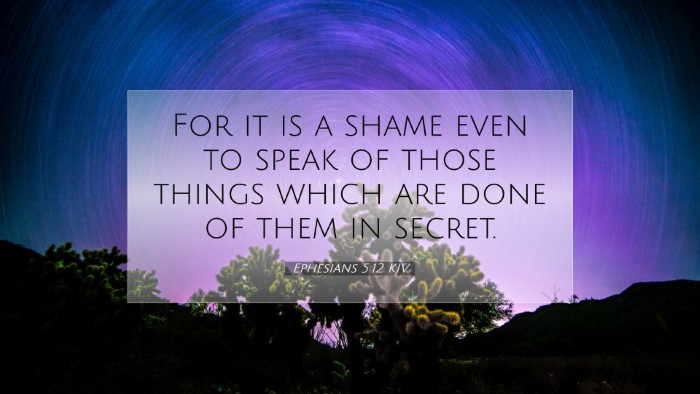Ephesians 5:12 - Commentary Summary
Verse Text: "For it is shameful even to mention what the disobedient do in secret."
Introduction
This verse serves as a moral warning about the dark practices of those who live in disobedience to God. The apostle Paul writes to the Ephesians to highlight the contrast between the light of Christ and the darkness of sin. This commentary seeks to draw on insights from prominent public domain commentators to provide a richer understanding of the text and its implications for believers today.
Historical Context
The book of Ephesians was written by the Apostle Paul while he was imprisoned in Rome. His purpose was to encourage the early Christians in Ephesus to live a life consistent with their calling. Understanding the cultural background of Ephesus, known for its worship of Artemis and moral debauchery, enriches our comprehension of Paul's admonitions.
Thematic Analysis
This verse addresses several key themes that resonate throughout Christian teaching:
- Light vs. Darkness: Paul often contrasts light and darkness, symbolizing righteousness and unrighteousness. This duality underscores the necessity for believers to embrace the light of Christ.
- Shame and Disgrace: The term “shameful” creates a powerful image of disgrace associated with sinful actions, suggesting that such deeds should not even be spoken of among Christians.
- Community Standards: By highlighting the need for discretion regarding sinful behaviors, the text calls believers to set a standard that reflects their faith.
Commentators' Insights
Matthew Henry
Matthew Henry emphasizes the seriousness of Paul’s admonition, explaining that while the deeds of darkness may be prevalent in society, Christians are called to refrain from even discussing such matters. He notes, "It is but a shameful thing to speak of shameful things." Henry encourages believers to focus on what is good and to avoid the trivialization of sin.
Albert Barnes
Albert Barnes points out that this verse serves as a reminder of the integrity expected of believers. He states, "To speak of the wickedness of others in an improper and indelicate manner is to add to their shame." Barnes stresses the importance of exercising wisdom in communication, advocating for a focus on edifying conversation that promotes holiness.
Adam Clarke
Adam Clarke underscores the need for believers to maintain a level of moral propriety in their discussions. He comments that the works of darkness should not only be avoided but should also evoke a sense of caution and seriousness, stating, "The mention of such things must be avoided by those who walk in the light." Clarke's insight points to a greater societal responsibility for believers, encouraging them to live as examples of Christ's light.
Theological Implications
The implications of this verse are significant for teachers, pastors, and theologians:
- Moral Responsibility: The passage teaches that Christians have a moral obligation to distance themselves from sinful discussions, highlighting a call to higher living.
- Authentic Christianity: This idea fosters a Christianity that is genuine and distinct, where believers do not partake in or endorse sinful behaviors even in conversation.
- Transformation and Witness: The proper handling of conversations about sin speaks to the transformative power of the Gospel. The church is called to be a light in a dark world, which includes how it engages with topics of morality.
Practical Application
For pastors, students, and scholars, this verse offers various practical applications:
- Preaching and Teaching: When addressing matters of sin, emphasize a positive approach that highlights redemption rather than merely exposing wrongdoing.
- Personal Conduct: Reflect on how personal conversations align with this teaching. Develop a conscious effort to avoid discussions that do not uplift or encourage righteousness.
- Church Community Standards: Foster a church environment where accountability exists, encouraging members to discuss moral issues in a way that is constructive and reflective of their faith in Christ.
Conclusion
Ephesians 5:12 provides profound insights into the relationship between believers and the moral fabric of the society in which they reside. Drawing from the wisdom of Matthew Henry, Albert Barnes, and Adam Clarke, we are reminded not only to avoid the mention of sinful deeds but also to cultivate a lifestyle that glorifies God and reflects His light in a dark world. May we heed this admonition and strive for a life that adorns the Gospel in all our conversations and actions.


